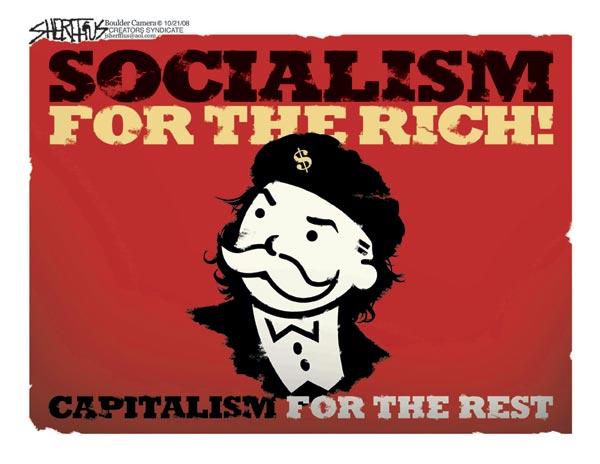子夜读书心筆
写日记的另一层妙用,就是一天辛苦下来,夜深人静,借境调心,景与心会。有了这种时时静悟的简静心态, 才有了对生活的敬重。How can you not love this cartoon?
John Sherffius is the creator of this. If anyone knows how to get a hold of him (I already tried the online email) I would love to get permission to use a few of his cartoons for the book.
**Keynesian student is now saying Keynes had no sure cure. Perhaps one can't just spend his way out of the recession. Just a little bit academic here..
Fiscal Policy Puzzles
by Greg Mankiw
As a student of Alan Blinder, Larry Summers, and Stanley Fischer, I was trained to view the short-run effects of fiscal policy through the lens of Keynesian macroeconomic theory. I am sure that many of the economists in the new Obama administration share that intellectual framework. After all, they include my teachers (Larry Summers), my fellow students (Christina Romer), and my own students (Jason Furman).
Many macroeconomists, however, are skeptical of the Keynesian model. And even among modern Keynesians, there is disagreement about specifics. I think it is fair to say that short-run business cycle theory remains one of least settled parts of economics. Any economist approaching the subject should bring an ample dose of humility. (The alternative is a surfeit of hubris--a character trait all too common among economic commentators.)
The Keynesian model has some clear, useful insights about how to think about fiscal policy during economic downturns. But are those insights true?
One approach to answering this question is to examine the data using the techniques of time-series econometrics without imposing much a priori theory. For monetary policy, there is a large literature that does this; for fiscal policy, the literature is smaller but growing. The results from this exercise, however, do not always confirm the predictions from textbook Keynesian models.
For example, here is the conclusion of Andrew Mountford and Harald Uhlig (a prominent econometrician now at the University of Chicago) in an empirical study called "What are the Effects of Fiscal Policy Shocks?":
- a surprise deficit-financed tax cut is the best fiscal policy to stimulate the economy
- a deficit[-financed government] spending shock weakly stimulates the economy.
- government spending shocks crowd out both residential and non-residential investment without causing interest rates to rise.
Our main results are that
These finding are not consistent with standard Keynesian theory, according to which government spending multipliers are larger than tax multipliers and crowding out occurs through increases in interest rates.
Similarly, an earlier, related paper by Olivier Blanchard and Roberto Perotti called "An Empirical Characterization Of The Dynamic Effects Of Changes In Government Spending And Taxes On Output" reported other anomalous results:
we find that both increases in taxes and increases in government spending have a strong negative effect on private investment spending. This effect is consistent with a neoclassical model with distortionary taxes, but more difficult to reconcile with Keynesian theory: while agnostic about the sign, Keynesian theory predicts opposite effects of tax and spending increases on private investment. This does not appear to be the case.
Blanchard, incidentally, is now the chief economist at the IMF.
I am not sure how convinced I am by these findings. And even if they are correct, I am not sure to what extent they apply to the extraordinary economic circumstances we now face. At the very least, these puzzles should give us reason to pause when using the Keynesian framework for policy analysis. There is still a lot about macroeconomics that we do not fully understand.





